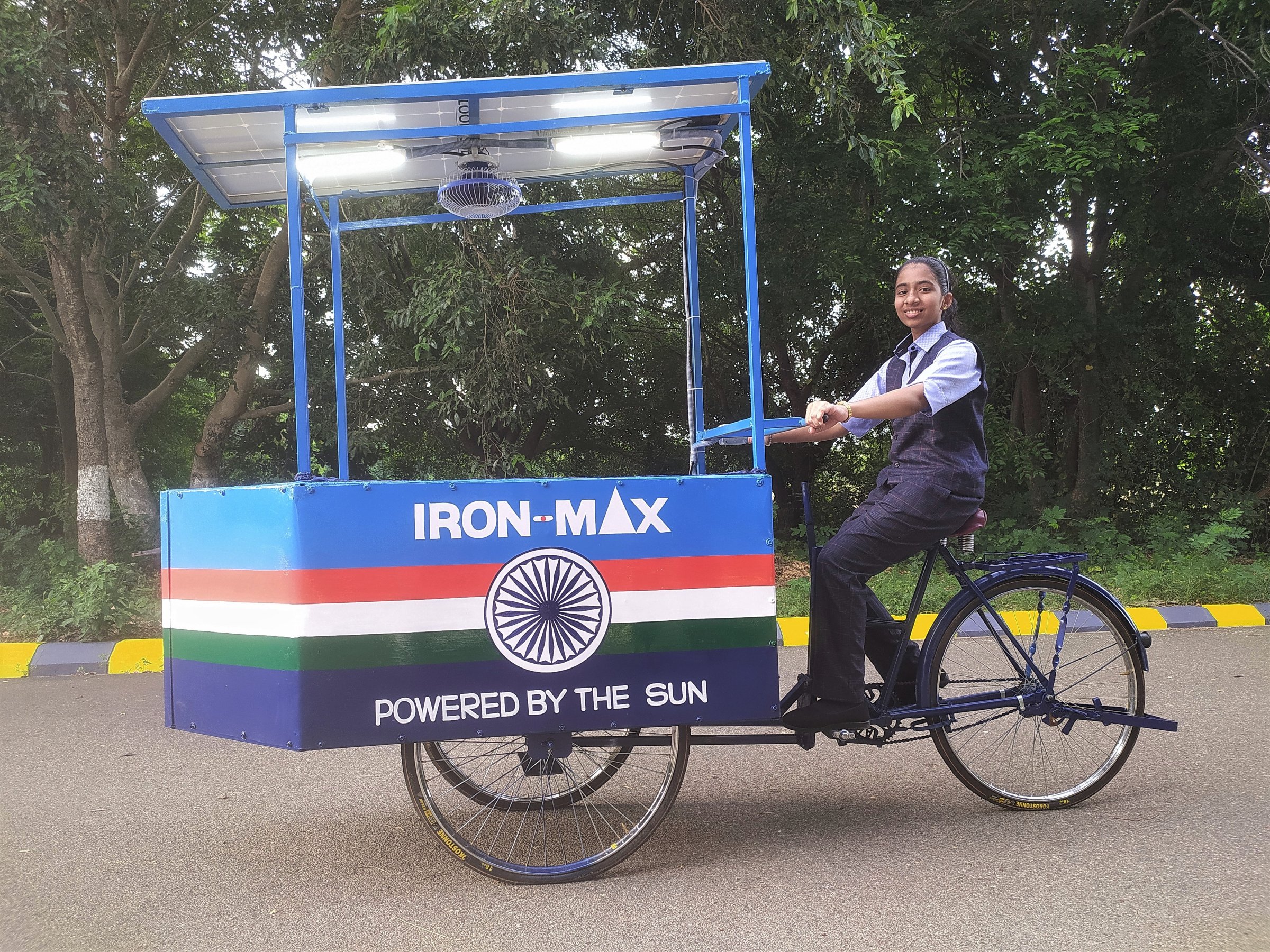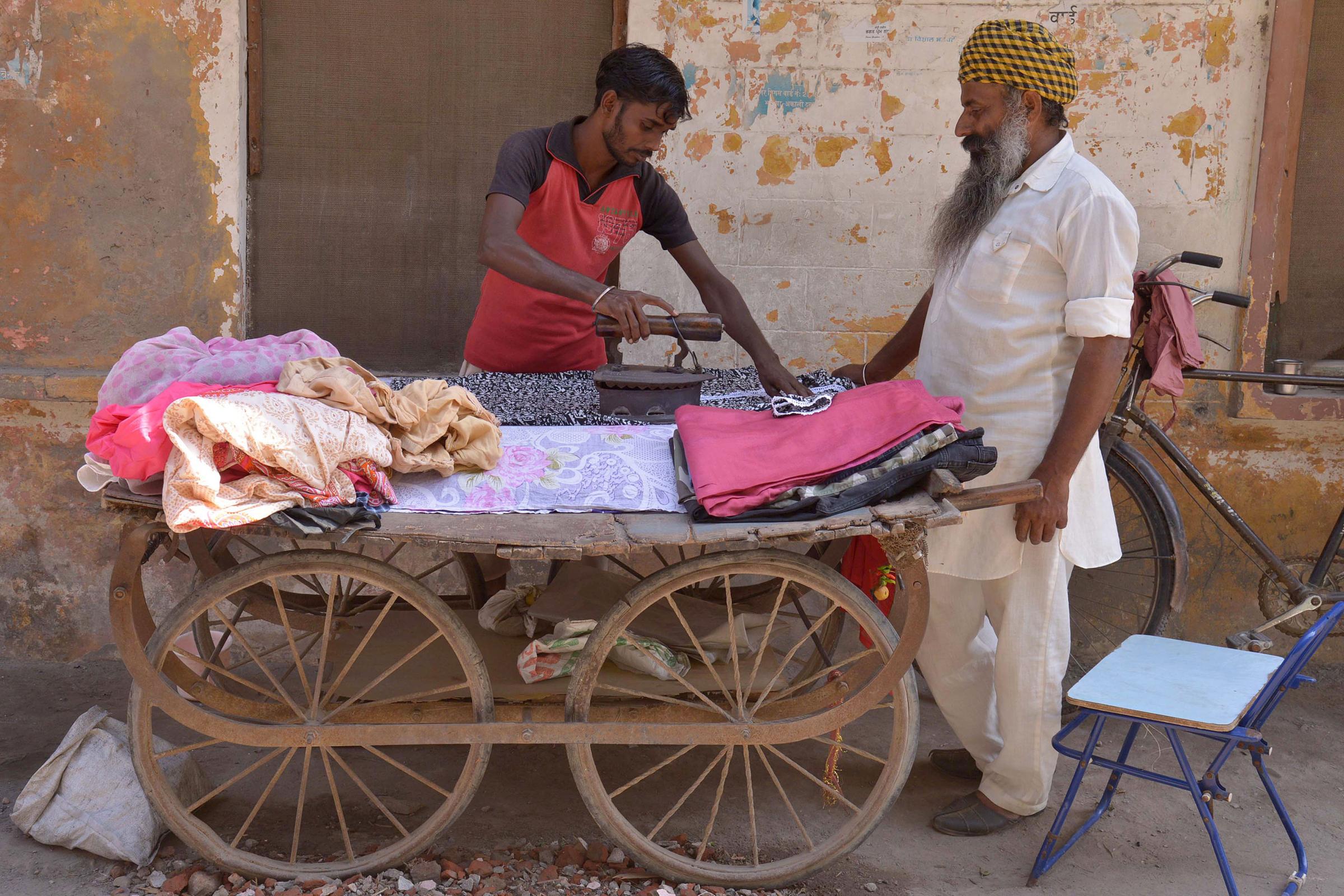
Tell Vinisha Umashankar that your teen years pale in comparison to hers, and she is quick to remind you that everyone has a different life journey.
But the 14-year-old also knows that the future looks very different for her generation if the world doesn’t act to slow global warming and the effects of climate change. Still, she’s optimistic that “collective action” of people her age will turn the tide.
That’s probably why Umashankar has already been doing more than her fair share. In Tiruvannamalai, a small temple town in the southern Indian state of Tamil Nadu, she designed an ingenious solar-powered alternative for the millions of charcoal-burning ironing carts that ply the streets of India’s cities—pressing clothes for workers and families.
Her invention is now getting global recognition. Umashankar is the youngest finalist for the first Earthshot Prize, a £1 million ($1.3 million) award launched by Prince William, the Duke of Cambridge. The initiative plans to give £50 million ($68 million) in awards over the next decade to people working to solve environmental problems, with the aim of providing “at least 50 solutions to the world’s greatest problems by 2030.” (Marc and Lynne Benioff, TIME’s owners and co-chairs, have been among the philanthropic supporters of the effort.)
READ MORE: Prince William Announces Environment Prize, Calls for ‘Decade of Action to Repair the Earth’
There are 14 other finalists including, the Republic of Costa Rica for a scheme that helped revive rainforests, the Italian city of Milan for cutting down on waste while trying to resolve hunger and a Chinese app, The Blue Map App, that allows citizens to report environmental violations. Five winners will be announced on Oct. 17.
Umashankar’s invention is especially significant in her native India, which is home to 22 out of the 30 most polluted cities in the world, according to a report by IQAir, a Swiss air quality technology company. In 2019, 1.6 million deaths in India were attributed to toxic air. The country is also the world’s third-highest carbon dioxide emitter, after China and the U.S., despite being one of the most vulnerable countries to the impact of human-induced climate change.
It’s these pressing problems that Umashankar aims to address by reducing the use of charcoal with her solar-power ironing cart. Ironing vendors, called “press wallahs,” pushing their carts from one neighborhood to the next are a common sight in India. According to the Indian government’s science and technology department, there are an estimated 10 million ironing carts in the country. Each of them uses about 11 pounds of charcoal daily, taking a heavy toll on the country’s air and forests.

For Umashankar, it started as an internet search during her summer break in 2018. After seeing her neighborhood ironing vendor disposing of used charcoal, Umashankar was curious to learn about the environmental and health hazards of ironing carts burning charcoal all day. “That’s when I learned that something as common as an iron can have such dangerous consequences,” she says.
Umashankar had been fascinated by science ever since her parents got her an encyclopedia at the age of 5. She had previously designed a ceiling fan that operates based on motion sensors. After seven months of researching solutions to the traditional charcoal-heated ironing cart, she started working on a design.
The cart’s roof doubles up as a panel that absorbs sunlight to convert it into electricity to fuel the iron. Surplus energy is stored in a battery for use after dark and on overcast days. By late 2019, she had won a national-level award for her design, following which it was prototyped and patented. She hopes to get the manufacturing process for her carts started later this year or early 2022.
Umashankar believes winning the Earthshot Prize will help her kickstart the process to commence manufacturing. “An innovation’s true potential is understood only when it reaches people,” she says. “A customer’s perspective will help me understand what to change and improve.”
Even as she awaits the Earthshot results, Umashankar says she is working on five other projects, all aiming to solve environmental problems. While juggling school work and her innovative side projects is not an easy feat, she feels it’s critical to keep going; time is running out. “We are trying to restore our planet in less than a century, and that’s not much time compared to the time it took us to get to this point,” she says.
But she is also cautiously hopeful. The COVID-19 pandemic is a reminder of human versatility and adaptability, she says. She feels the need to seize this moment to use technology to drive innovation and move towards a sustainable future that is accessible and affordable. “[During the pandemic] we worked our way around and figured out alternative methods to get things done,” she says. “I believe we can take the same initiative for the future and for our planet.”
More Must-Reads from TIME
- Cybersecurity Experts Are Sounding the Alarm on DOGE
- Meet the 2025 Women of the Year
- The Harsh Truth About Disability Inclusion
- Why Do More Young Adults Have Cancer?
- Colman Domingo Leads With Radical Love
- How to Get Better at Doing Things Alone
- Michelle Zauner Stares Down the Darkness
Write to Abhishyant Kidangoor at abhishyant.kidangoor@time.com